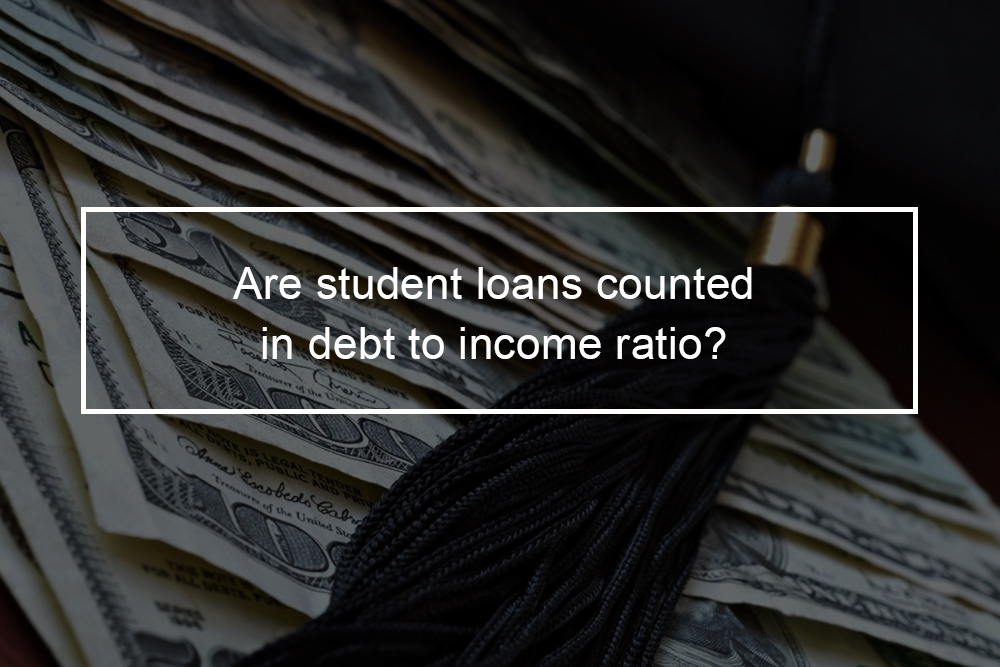Obviously, student loans are a kind of debt. Similar to other loans, your student debt shows up on your credit card report. A potential creditor or landlord will see your investment and factor it into your debt to income ratio(DTI ratio). However, student loans will impact your DTI differently based on the situation. Your student loan debt also impacts whether you can buy a house in both direct and indirect ways. Let us outline what goes explicitly into the DTI ratio and how student loans factor into several scenarios
What is the debt-to-income ratio?
It is a ratio that impacts your ability to access loans. The basic idea is in case you have too much debt comparative to your income; creditors might hesitate or deny you credit for a large purchase. Your debt-to-income ratio (DTI) most frequently up when purchasing a house. However, it is considered by potential lessors of cars or landlords. By pulling your credit report, someone can enumerate your DTI and decide if you qualify a loan or lease. Your debt-to-income ratio is enumerated by comparing your monthly debt obligations with your monthly income. Your debt obligations comprise recurring debt, which is a debt you cannot cancel at any time. This consists of mortgage, car loans, rent, child support, monthly minimum credit card payments, child support, and of course, personal loans. These debts will not disappear until you have repaid them fully.
Understanding debt-to-income ratio and student loan
The impact of student loans on debt to income ratio
Student loans can be challenging when calculating DTI. The reason is most borrowers have federal student loans, and federal loans provide a lot of different repayment plans, like income-driven repayment plans or a graduated repayment plan. Private loans, since repayment options are far fewer, are very straightforward. Let’s go through the most common situations where DTI is a significant element and discuss how student loans impact the situation.
Getting a mortgage
Buying a home is possibly the greatest purchase you will make in your life. Your experience getting a mortgage to finance said home varies based on your personal finances, inclusive of DTI, together with the rules of the creditor you are dealing with.
Most lenders sell the mortgages they provide- and the two biggest purchasers of mortgages are the Federal National Mortgage Association and the Federal Home Loan Mortgage Corporation. Both associations issue guidelines to lenders to maintain the quality of the loans they purchase and insure. These comprise guidelines about DTI and student loans for attaining a mortgage. The two organizations work similarly, even though they have different rules that guide every organization.
Both institutions have issued new guidelines in 2017 concerning student loans and lending practices. These may impact your ability to get a mortgage, or they may even be the deciding factor. Nonetheless, each lender is different, and their adherence to guidelines might fluctuate. Typically student loan debt affects if you get a mortgage in the following ways:
- Student loan payments often make saving for a down payment more challenging and mortgage payments difficult after you are a homeowner.
- Student loan debt may raise your debt-to-income ratio. Influencing your ability to qualify for a mortgage or the rate you can get.
- Missing a student payment can reduce your credit score, but consistently paying on time can bolster it.
- Although having student loans does not mean you will never be able to afford a house.
Getting a car loan
In case you need a loan to purchase a car, and you have student loan debt, the creditor will also be looking at your DTI. Mostly, a DTI of thirty-six percent or below is ideal for getting a reasonable deal on a car. In case you are making the regular, full payments on your student loans, your situation is very straightforward for the creditor. Nonetheless, once again, the IDR plans may not appear on your credit report, therefore p[otentially throwing your DTI out of whack.
Renting an apartment or a house
The impact of your DTI on your ability to rent a house or an apartment varies mainly by location and property owner. The United States is vast, with wild differences in rent. Landlords also differ widely in their standards or rental management style. Most landlords hire property managers to screen potential tenants and manage current rentals.
Typically, landlords not only want to know that you have the money to pay, but they also want to ensure that the rent will not consume too much of your income. The landlords will be able to tell by calculating your DTI ratio and factoring in the lease of their property. Most landlords will need that the rent will amount to no more than thirty-three percent of your income. Some landlords may be more lenient and go up to forty-five percent or fifty percent. Again, this is based on the property manager or landlord.
Getting and keeping your job
It is routine for employers to run background checks on potential employees, but they may go more in-depth and take a look at your credit report and calculate your DTI. Particularly in case your job comprises access to sensitive data or money management; an employer may want to know that you can control your own finances effectively.
Typically, there are so many components out of your control that would raise your DTI, but may not comprise your ability to do well at a specific job, even though it does need money management. Whereas we do not recommend bringing up your DTI not unless asked about it, it is a good idea to have a narrative in place that does not sound like a bunch of excuses, but frames the recipient. Mainly if your student loans are a significant contributor to your DTI, you should prepare some answers about your education and how it might have assisted you, how you are managing your debt and your plans for repayment. Note that your student loan debt could get you fired from your job.
How student loans affect your credit score?
A good credit score indicates a better chance of getting approved for a mortgage and receiving a favorite interest rate. Payment history makes up thirty-five percent of your FICO score, one of the two chief credit scoring tools, and mortgage lenders want to see a report of on-time debt payments. Paying student loans consistently on time will improve your score. On the other hand, a missed payment or allowing your loan default will hurt it. A credit mix is a smaller element of your credit score. But using a variety of credit kinds- like student loans, credit cards, and car loans- can assist your score as long as you are making payments on time.
How to manage your DTI via your student loans?
Your student loans may be bringing your DTI too high to secure a mortgage, a rental home, a car loan, and more. You cannot negotiate your balance on your student loans, but in case you have federal loans, and you are eligible for an income-driven repayment plan, it might give you a chance to decrease your DTI significantly. IDRs are not right for everybody, so you want to consider your financial situation carefully before you dive into one.
Checking on your credit report to ensure that everything is being accurately reported is a good idea too. While not common, sometimes the same loans are erroneously reported multiple times on a credit report, a mistake that will affect your DTI definitely. Typically, student loan debt can be a drag, particularly in case you are trying to purchase a house. Luckily, there are alternatives. By taking advantage of the right loan services, working on your DTI and credit, and teaming up with the right partners, you can enhance your chances significantly (not to mention, lower the cost of purchasing a home-both up front and the long haul).













